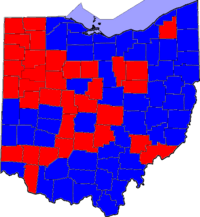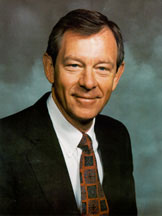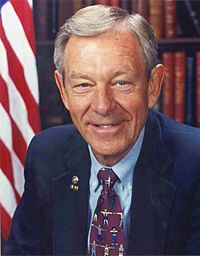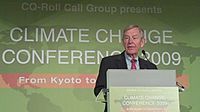George Voinovich facts for kids
Quick facts for kids
George Voinovich
|
|
|---|---|
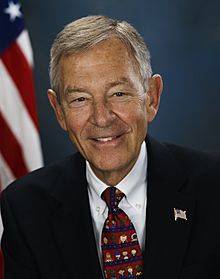 |
|
| United States Senator from Ohio |
|
| In office January 3, 1999 – January 3, 2011 |
|
| Preceded by | John H. Glenn, Jr. |
| Succeeded by | Rob Portman |
| 65th Governor of Ohio | |
| In office January 14, 1991 – December 31, 1998 |
|
| Lieutenant | Mike DeWine Nancy P. Hollister |
| Preceded by | Richard Frank Celeste |
| Succeeded by | Nancy P. Hollister |
| 54th Mayor of Cleveland | |
| In office 1980–1989 |
|
| Preceded by | Dennis Kucinich |
| Succeeded by | Michael R. White |
| 56th Lieutenant Governor of Ohio | |
| In office January 8, 1979 – November 1979 |
|
| Governor | Jim Rhodes |
| Preceded by | Dick Celeste |
| Succeeded by | Myrl Shoemaker |
| Member of the Ohio House of Representatives from the 53rd district |
|
| In office January 3, 1967 – December 15, 1971 |
|
| Preceded by | New seat |
| Succeeded by | Edward Ryder |
| Personal details | |
| Born | July 15, 1936 Cleveland, Ohio |
| Died | June 12, 2016 (aged 79) Cleveland, Ohio |
| Political party | Republican |
| Spouse |
Janet Voinovich
(m. 1962–2016) |
| Children | George Voinovich Betsy Voinovich Peter Voinovich Molly Voinovich (deceased) |
| Residence | Cleveland, Ohio |
| Alma mater | Ohio University (B.A) Ohio State University (J.D.) |
| Occupation | Attorney |
George Victor Voinovich (born July 15, 1936 – died June 12, 2016) was an American politician. He was a member of the Republican Party. Voinovich served as a U.S. Senator for the state of Ohio from 1999 to 2011.
Before becoming a senator, he was the 65th Governor of Ohio from 1991 to 1998. He also served as the Mayor of Cleveland from 1980 to 1989.
Contents
Early life and education
George Voinovich was born in Cleveland, Ohio, on July 15, 1936. His family had roots in Croatia and Slovenia. He grew up in Collinwood, a suburb of Cleveland.
He went to Ohio University and earned a degree in government. Later, he studied at Ohio State University and received a law degree.
Beginning a political career
Voinovich started his political journey in 1963 as an Assistant Attorney General for Ohio. He then became a member of the Ohio House of Representatives from 1967 to 1971. After that, he worked as the County Auditor for Cuyahoga County, Ohio, from 1971 to 1976.
In 1971, he first tried to become Mayor of Cleveland but did not win. From 1977 to 1978, Voinovich was part of the Cuyahoga County Board of Commissioners. In 1978, he was elected Lieutenant Governor of Ohio.
Mayor of Cleveland (1980–1989)
Running for mayor
In 1979, the mayoral elections in Cleveland were open to all parties. The current mayor, Dennis Kucinich, was facing a tough re-election. Voinovich decided to run for mayor again. He made this decision on July 26, 1979, while still serving as lieutenant governor.
During the campaign, a sad event happened: his nine-year-old daughter, Molly, passed away in an accident. This difficult time paused his campaign and changed the election mood.
Voinovich won the election and was re-elected twice by large majorities. In 1981, he won Cleveland's first four-year mayoral term. In 1985, he won again, showing strong support from the voters.
Leading the city
As mayor, Voinovich worked hard to change Cleveland's image. Many people thought Cleveland was struggling, but Voinovich took a strong approach. He wanted to show everyone that Cleveland was a great city.
A group called the New Cleveland Campaign started sharing positive news about the city. Many people felt Voinovich helped improve Cleveland. Even presidential candidates like Jimmy Carter and Ronald Reagan came to Cleveland for debates. Time Magazine even said, "Cleveland is making a comeback."
To get more done, Voinovich believed the terms for mayor and Cleveland City Council members should be longer. He asked voters to approve extending terms from two to four years. He also asked them to reduce the number of council members to help the city's economy. Voters agreed to both ideas.
Voinovich was also a member of the National League of Cities and became its President in 1985. Cleveland received the All-America City Award three times during his time as mayor (1982, 1984, 1986).
In 1988, he ran for a U.S. Senate seat but lost to Howard Metzenbaum. Voinovich finished his term as mayor in 1989.
Governor of Ohio (1991–1998)
In 1990, Republicans chose Voinovich to run for governor. He easily defeated his opponent, Anthony J. Celebrezze, Jr.
During his first four years as governor, he helped Ohio recover from a large budget problem. He also became a national leader in changing welfare programs. In 1991, Voinovich was the Chairman of the Midwestern Governors Association.
In 1994, Voinovich was re-elected governor by a huge margin. He defeated Democrat Robert L. Burch Jr.
In his second term, Voinovich continued to make a difference. In 1995, he was named Public Official of the Year by the National Journal. He was praised for his leadership in creating a plan to help students attend church-affiliated schools using public funds. When some wanted to close Central State University, a historically black college, Voinovich stepped in to help keep it open.
In 1996, Voinovich was the first governor to support U.S. Senator Robert J. Dole for president. Dole considered Voinovich as a possible running mate, but Voinovich chose to focus on running for the U.S. Senate instead.
In 1998, Voinovich could not run for governor again due to term limits. He decided to run for the U.S. Senate seat being left by John Glenn. He resigned as governor on December 31, 1998, to focus on his Senate campaign.
United States Senator (1999–2010)
In the 1998 Senate elections, Voinovich won with 56% of the votes, defeating Democratic politician Mary Boyle.
In the Senate, he sometimes worked with Democrats on tax issues. In 2000, he was the only Republican in Congress to vote against a bill related to the "marriage penalty" tax.
In November 2004, Voinovich ran for re-election and won against Eric D. Fingerhut. Voinovich won every county in Ohio and received the most votes ever in an Ohio U.S. Senate race, with 3.5 million votes.
Voinovich gained national attention when he spoke against the nomination of John R. Bolton as U.S. Ambassador to the United Nations. However, he later changed his mind and said Bolton did a "good job."
In January 2007, Senator Voinovich shared his concerns with Secretary of State Condoleezza Rice that increasing troops in Iraq might not be the best idea. Throughout his time in the Senate, he was against the War in Iraq.
On January 20, 2009, Voinovich was appointed to the Appropriations Committee. This was the first time an Ohioan had served on this important committee since 2006. Voinovich also sat at what is known as the 'candy desk' in the Senate.
Voinovich voted for important laws like the Matthew Shepard Act and the Don't Ask, Don't Tell Repeal Act of 2010.
In January 2009, Voinovich announced he would not seek a third term. He left office on January 3, 2011, and Rob Portman took his place.
Personal life
George Voinovich married Janet in 1962. They had four children: George, Betsy, Peter, and Molly. They also had seven grandchildren. Sadly, their youngest child, Molly, passed away at age 9 in an accident.
After retiring from the Senate, Voinovich lived in Cleveland with his wife. He became a Senior Fellow at Cleveland State University and a visiting professor at Ohio University.
In the 2016 U.S. presidential election, Voinovich supported John Kasich, who was then the governor of Ohio.
Death
George Voinovich passed away unexpectedly in Cleveland, Ohio, on June 12, 2016, at the age of 79.
Images for kids
See also
 In Spanish: George Voinovich para niños
In Spanish: George Voinovich para niños
 | Claudette Colvin |
 | Myrlie Evers-Williams |
 | Alberta Odell Jones |


